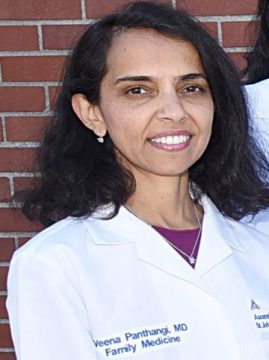
I’m thrilled to introduce you to this week’s guest columnist – Dr. Veena Panthangi, MD. Dr. Panthangi is a family medicine physician with Ascension Michigan in St. Clair Shores, where she provides comprehensive care for her patients and also provides a chronic pain clinic for elderly patients. This week, Dr. Panthangi shares insights into geriatric medicine – with a particular focus on caring for the entire person. We think you’ll benefit from her perspective and experience. Enjoy! – Terri
Geriatric Medicine: Giving a Quality of Life for the Elderly
By: Dr. Veena Panthangi, MD
Mind, mobility, medications, multi-complexity, and what matters most. In 2017, U.S. and Canadian specialists implemented these into Geriatric medicine for the proper care of the elderly, but Geriatric medicine is much more diverse and complex. Through my experience as a practicing geriatrician, I have found my occupation to be challenging and extremely rewarding in all cases. I have learned that geriatric medicine is not just the 5 Ms ( Mind, Mobility, Medications, Multi-complexity, Matters most), but encompasses many other factors that are specific to each individual. With each day, I learn more life lessons from my patients than I could from a textbook.
“Talk about your experience.”
Many times, we tend to neglect our elderly population, including their medical needs. This is the population that requires the most attention, the most patience, the most time, and the most love from physicians, yet there is little given. Through my time, I have realized that we need to devote more time to caring for our elderly loved ones, as they have devoted their time to caring for us. We must pay back the generational knowledge that they have given us, as one day this could be us in their place.
The Graying of America:
As this century grows older, the population will be aging along with it.
In fact, by mid-century, one in five Americans will be 65 years old or older, and more than 10 million Americans will be over age 85.
Geriatrics is a fast-growing field that focuses on our unique needs as we age.
Aging is associated with a higher burden of disease, disability, and complex medical needs. The geriatric assessment aids in the diagnosis of medical conditions; development of treatment and follow-up plans; coordination of management of care; and evaluation of long-term care needs and optimal placement. The geriatric assessment differs from a standard medical evaluation by including nonmedical domains; by emphasizing functional capacity and quality of life; and, often, by incorporating a multidisciplinary approach.
Efficient Communication With Your Physician is Most Important
Here’s what experts with the American Geriatrics Society’s Health in Aging Foundation suggest to help you get the most out of your visit with your provider:
Tip Sheet Before Your Appointment:
Make a List: Write down your goals for the visit and the things that most matter to you on that appointment. Keep it down to 2-3 items.
Bring Your Medications: In a bag to have your doctor review it. Bring your prescription and over-the-counter medications, vitamins, and herbal medications.
Bring a Buddy: A family member or a friend to provide information that you may forget.
Bring a Notebook, Paper & Pen: To write down what your health care provider tells you to help you later.
Ask Ahead for a Translator: If English is not your first language.

